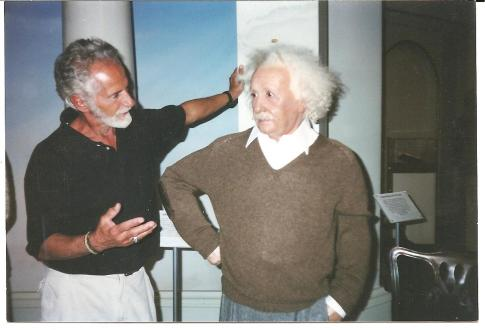One branch of my holy trinity of Newton, Darwin, and Einstein
Edit to add: Einstein is the text book example of the ethical clarity and moral consistency of supporting Jewish autonomy, while also being anti-Zionist.
Edit to add: Einstein is the text book example of the ethical clarity and moral consistency of supporting Jewish autonomy, while also being anti-Zionist.
Albert Einstein: Physicist, Philosopher, Humanitarian
In May 1905, an unknown 26-year-old Swiss patent clerk wrote to a friend about four scientific papers he had been working on in his spare time. He casually alluded to one as "revolutionary," and he confidently asserted that another would modify the "theory of space and time." He had not yet started on a fifth paper that would also come out in 1905 and that would propose a surprising and earth-shaking equation, E=mc2
Einstein's historic insights include:
Light has both wave- and particle-like properties.
Absolute space and absolute time are meaningless concepts.
Gravity is caused by the curvature of space-time.
Each of these ideas sparked a scientific revolution. The first led to quantum physics, which is the comprehensive picture of the world below the atomic scale. The second and third are conclusions from the special and general theories of relativity, which this course explains in nontechnical detail.
The many sides Albert Einstein:
Far from being a head-in-the-clouds theoretician, Einstein was an enthusiastic inventor who pioneered a novel airplane wing, a refrigerator without moving parts, and a self-adjusting camera, among other devices.
Einstein, a German Jew who fled an increasingly anti-Semitic Germany in 1932, supported the development of a safe haven for displaced Jews in Palestine and of Jewish institutions like Hebrew University. Fearing a large-scale conflict with Palestinian Arabs, however, he did not support a Jewish national state.
Theoretical physics in the early 20th century was an emerging field. Einstein's work at the boundaries of science forced him to grapple with the various philosophical issues his work raised. Einstein's philosophies on scientific issues—such as the difference between direct and indirect evidence, the relationship between theory and experience, and the power of mathematical simplicity—were among the most influential of 20th-century science.
source credit and inspiration: Professor Don Howard, Ph.D. University of Notre Dame
Last edited:


